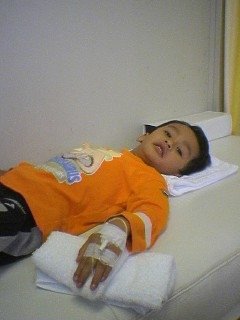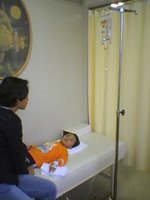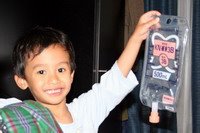When Hikari Gets Sick
Saturday, May 06, 2006 by Mariskova
 Very early sunday morning, Papap told me that Hikari was a little feverish. I touched his forehead and told Papap that may be it was the runny nose and cough he had been suffering for a week, but they were not so serious. That morning, I still went to my Japanese class, but that day Papap and Hikari didn't pick me up after my class like what they usually did every Sunday. Papap didn't want Hikari to go outdoor. Three hours later when I returned home, Hikari's temperature was slightly higher but he was still cheerful. He ate a lot during lunch and then played with his things. Then we all took our nap.
Very early sunday morning, Papap told me that Hikari was a little feverish. I touched his forehead and told Papap that may be it was the runny nose and cough he had been suffering for a week, but they were not so serious. That morning, I still went to my Japanese class, but that day Papap and Hikari didn't pick me up after my class like what they usually did every Sunday. Papap didn't want Hikari to go outdoor. Three hours later when I returned home, Hikari's temperature was slightly higher but he was still cheerful. He ate a lot during lunch and then played with his things. Then we all took our nap.We woke up around 4 PM to find that his temperature was really really high! We gave him some medicine for his fever, runny nose, and cough. Nothing seemed to work, though. He was getting weak and the temperature was getting higher. We were concerned a lot because Hikari has a nasty history of illnesses. He was born with immune system deficiency resulted from having a high level of sensitivity (of substances around) and allergies. A slight-common cold for normal children make him suffer 10x worse, let alone fever. So, we were thinking of taking him to the emergency unit for his temperature was rising more and more.
The problem in Honjo is although there are some big hospitals and a lot of clinics, during weekends and public holidays there is only one ER operating. And that ER is not always in the same hospital! They take turn in providing the service for ER. So, if last-week ER is in Honjo Public Hospital, this-week ER will be in another. If we want to go to ER during holidays, we need to call the ER hotline service to ask which hospital is open. OR, we call Honjo ambulance. Both the hotline service and the ambulance are easily accessed, for Japanese speakers, that is!
We didn't want to call the ambulance because that would 'alert' the whole dorm-occupants, but we couldn't call the hotline service because our Japanese was not sufficient. Then, I called my Japanese teacher to ask him to find an open hospital.
Shoda sensei came 15 minutes later. When he came Hikari's temperature was 39 something and he had been vomitted several times. He complained a lot about the pain his stomach. Sensei told us that we needed to go to a child hospital in Fukaya, Honjo's neighboring town, because there was no pediatrician available in Honjo! He made phone calls to Fukaya. The pediatrician there told us to wait several hours while we gave Hikari first-aid treatment which she instructed us. The doctor thought Hikari's condition was not alarming at that time for several reasons: no diarrhea, the fever was still in the 'normal' range, Hikari still had apppetite, he didn't lose consciousness, etc. So we waited. My Sensei left home 2 hours later, but told us to call him anytime if Hikari got worse, or he would return the next morning to take us to Honjo hospital.
That night, neither of us slept. Hikari was getting restless and there was no indication that his temperature was going down. He had interrupted sleep and occassionally talked in his sleep, which was rather scary. We were afraid that he would lose his consciousness or even would have seizures. Those were the longest hours in my life. I wished 8 AM came faster but it didn't.
Early in Monday morning, Shoda Sensei came to pick us up to Honjo Public Hospital. He made arrangements in the hospital before so that when we arrived everything was ready for us. The doctor examined Hikari and asked his condition: fever 38-39, cramps and pain in the stomach, nausea and vomitting, no appetite, a runny nose and cough, a headache. She gave us her diagnosis. Kaze, she said, in the stomach. Another name is stomach flu. She gave us prescription and told us that Hikari was not in serious condition. She didn't give us any medicine for fever, though, because she thought it wouldn't be necessary.
Papap, especially, was not convinced. Hikari's condition was worse than just a stomach flu. But we went home and hoped that the drugs worked. Later that evening, we were forced to call my Sensei again to tell him that Hikari was not getting better. Shoda Sensei and his wife came to our room. They brought water pillow for Hikari and stayed for a while. At that time, Hikari's fever was 39.7C. Sensei ran back to the hospital to meet the doctor but the hospital was already closed. He returned to our room and later took Papap to buy some medicine for fever. In the drugstore, the pharmacist told Papap the reason why the prescribed drugs didn't work: most oral drugs wouldn't work in the fever higher than 38.5C! So, the pharmacist gave Papap an anal medicine for fever... It hurt just looking at the medicine! Again that night we didn't sleep. Morning was very far away.
 Tuesday morning, we went again to the same doctor. She took Hikari's urine sample, installed an IV for him, took his blood sample, and ran a 3D USG for his stomach, chest, neck, and back. Papap bet on typhoid, I bet on food poisoning, bacterial or viral infection. We bet on everything. I couldn't stop blaming myself for this because I thought this illness came from food, rotten food, bad food, bad-hygienic food. And if it did, I was the one to blame!
Tuesday morning, we went again to the same doctor. She took Hikari's urine sample, installed an IV for him, took his blood sample, and ran a 3D USG for his stomach, chest, neck, and back. Papap bet on typhoid, I bet on food poisoning, bacterial or viral infection. We bet on everything. I couldn't stop blaming myself for this because I thought this illness came from food, rotten food, bad food, bad-hygienic food. And if it did, I was the one to blame!3 hours later, when the IV was finished, the doctor told us the test result: she found no bacteria nor virus, and nothing was wrong with Hikari's stomach! She stick to the first diagnosis: stomach flu. Only this time, it got worst... because it was IN Hikari.
Until today, Hikari was still pale and weak. His fever is still around 37-38, but more stable. He doesn't complain about stomachache anymore and although he still feels nausea he doesn't vomit anymore. Shoda Sensei and his wife still checks on him every now and then, and we still struggles during the nights. But Hikari is getting better and I had stopped crying. Alhamdulillah.
Right now we still struggle a lot. Not with the sickness, but with the drugs. Giving medicine to a 3-year-old is close to fighting the WWII alone. He asks one thousand annoying Whys (why do I
 have to take that med? why is the taste bitter? why oh why). And if we give him 2 thousand because-ofs, he will ask another 3 thousand whys... Even saying 'Because I Told You So' doesn't work at all!
have to take that med? why is the taste bitter? why oh why). And if we give him 2 thousand because-ofs, he will ask another 3 thousand whys... Even saying 'Because I Told You So' doesn't work at all!The funny thing of all of this is when the doctor wanted to inject the IV to him. He cried and screamed told her to stop because it hurt, but he did it all in Japanese, making both the doctor and the nurse laughed. And then when it was time to pull his IV, Hikari refused and told the doctor that he wanted to to bring the IV home because (he thought) the IV was the one that made his sickness go away. At the end of the day, the doctor let Hikari brought the IV bag home :) Papap and I stood there amused for Hikari was able to communicate with the doctor and hospital staff in Japanese effortless, while we couldn't even say 'Itai' (it hurts) in a natural tone...
 Having a sick child (or being sick) in a foreign country where the language is the biggest problem is terrifying. We were lucky and thankful that we have kind friends. My 70-year-old Sensei and his wife made us feel like we have our parents nearby. We were also lucky that this hospital thing didn't cost us a Yen because the government takes care of the children health issues. This wouldn't be the case back home. From our experience in Jakarta, everytime Hikari's illness forced us to deal with the doctor/ER/hospital, by the end of it, it took all of our one-month paycheck...
Having a sick child (or being sick) in a foreign country where the language is the biggest problem is terrifying. We were lucky and thankful that we have kind friends. My 70-year-old Sensei and his wife made us feel like we have our parents nearby. We were also lucky that this hospital thing didn't cost us a Yen because the government takes care of the children health issues. This wouldn't be the case back home. From our experience in Jakarta, everytime Hikari's illness forced us to deal with the doctor/ER/hospital, by the end of it, it took all of our one-month paycheck...







